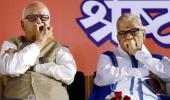'We were expecting at least they would be held guilty, but instead they have gone scot-free.'

The Babri Masjid demolition case has been decided after 28 years, with the special CBI court acquitting all the 32 accused that included Lal Kishenchand Advani, Murli Manohar Joshi and Uma Bharti.
Delivering the much-awaited verdict in the 28-year-old case, CBI Judge S K Yadav did not accept newspaper reports and video cassettes as evidence, reports Press Trust of India.
All the accused faced charges of conspiracy and promoting enmity between different groups on grounds of religion. However, Judge Yadav dismissed all the evidence proffered by the CBI and said the demolition of the mosque on December 6, 1992, was not a pre-planned act.
Speaking to Syed Firdaus Ashraf/Rediff.com soon after the verdict was pronounced, S Q R Ilyas, joint convener, Babri Masjid Action Committee and a member of All India Muslim Personal Law Board, says, "Babri Masjid was a strong structure and it could not have fallen without planning."
Your first reaction to the judgment?
It is very unfortunate.
Everybody knows who instigated the people to come to Ayodhya on December 6, 1992.
Everybody knows who gave motivated speeches like 'Ek dhakka aur do Babri Masjid tod do'. All these evidences are there.
And apart from that, there were so many eye-witnesses and prominent journalists who were present at the time of demolition of the Babri Masjid.
But all these factors were not considered in the judgment, and that is very unfortunate.
Why do you feel it was not a spontaneous decision of kar sevaks to demolish the Babri Masjid?
It was not spontaneous.
The Babri Masjid was a strong structure and it could not have fallen without planning.
And these people who demolished the Babri Masjid came with shovels, hammers, ropes and other things. It was well-planned.
What is your next move now?
Our working committee will read the judgment and decide whether we will challenge it or not.
Kalyan Singh, as then chief minister of Uttar Pradesh, had given a commitment to the Supreme Court of India that he will ensure the protection of Babri Masjid.
He did not keep his promise and he too has been let off.
Uma Bharti said that day, 'Ek dhakka aur do, Babri Masjid tod do' -- she too has gone scot-free.
People who were on the stage were embracing each other after the Babri Masjid fell. What else proof does one need?
L K Advani had described the demolition of the Babri Masjid as the saddest day of his life.
Let him say anything later on. It is a well documented fact that he took out a rath yatra across India and there were riots across India due to which thousands of people lost their lives.
And now if he says it was the saddest day of his life, can anyone believe him? The answer is, no.
In your opinion where did the prosecution fail in proving its case?
There is one Urdu shayri.
Vahi Qatil Vahi Shahid Vahi Munsif Thahre,
Aqraba mere karen qatl ka dawaa kis par
He is my murderer, he is the witness, he is the judge
Then who will my relatives accuse of my murder?
The CBI is a so-called independent agency, but they don't act so and it is unfortunate.
Even if you see past experiences where the CBI was involved in solving corruption cases, you will find many cases got buried.
Another thing, it is said that audio and video evidences presented before the court were not clear and visible. But there were other media organisations who covered it well.
The CBI could have procured those videos and produced those evidences in court, but they did not do it.
December 6, 1992, was once considered National Shame Day, but now all seems to have been forgotten.
This was said by Dr Shankar Dayal Sharma, then President of India.
The Supreme Court of India too while giving its judgment in the Ram Janambhoomi-Babri Masjid case in November 2019 said that the demolition of Babri Masjid was a crime and illegal.
So, we were expecting that at least a symbolic punishment would be given to the accused, but the court gave them clear-cut acquittal absolving them of their crime.
But you did believe they would get a symbolic punishment.
Yes, I was expecting it.
They would have not served the sentence in their lifetime as they would have gone to the high court or Supreme Court of India in appeal. Like Kalyan Singh had got one-day punishment earlier, which was symbolic.
We were expecting at least they would be held guilty, but instead they have gone scot-free.
Don't you feel 28 years is a long time and people should move on?
The Supreme Court of India gave a judgment in favour of the Ram mandir, but there is a saying that justice delayed is justice denied.
If some wrong has been done in history, then it must be corrected even if takes a long time to do so.
What will this judgment mean to Indian Muslims?
The Supreme Court of India said that it was wrong to demolish the Babri Masjid.
The Supreme Court of India said that the Ram idol placed in Babri Masjid in 1949 was a wrong act, and then they gave the Babri Masjid site to the same people who demolished it.
That was a very unfortunate decision and an injustice to Muslims.
After the Ram mandir decision you have let off these people now, so this judgment was not on unexpected lines for Indian Muslims.










